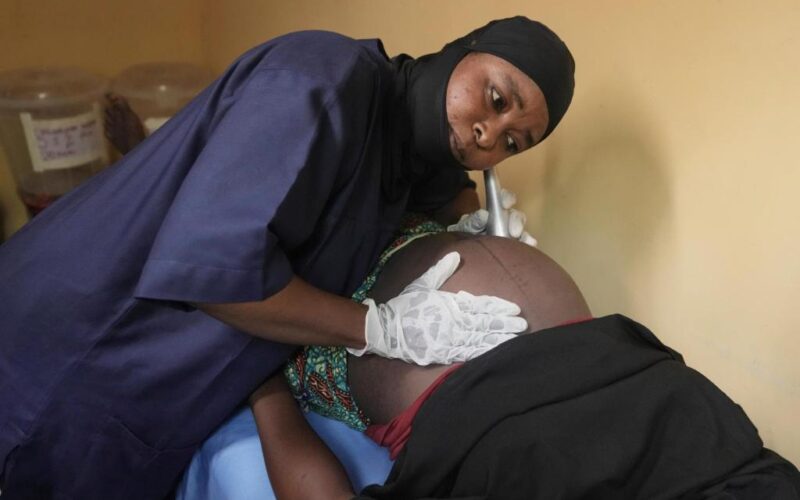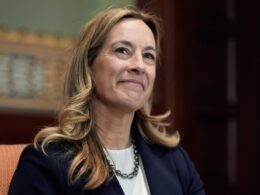By OPE ADETAYO
KONDUGA, Nigeria (AP) — Aisha Muhammed was in the third trimester of her pregnancy when she had the convulsions and high blood pressure of eclampsia, a leading cause of maternal death. Her village’s only health clinic had no doctor, and the only medical help was 25 miles away in one of the world’s most dangerous places.
More women die giving birth in Nigeria than anywhere else in the world, according to the World Health Organization. But Muhammed managed to reach the city of Maiduguri and have a cesarean section the next day, delivering twins in April.
“Even though children are a source of joy, if I will have to go through the same ordeal again, I am afraid of getting pregnant,” she said, fighting back tears.
The odds are stacked against pregnant women in Nigeria’s northeast like never before. The deadly Boko Haram militant group is making a resurgence. And hundreds of millions of dollars in foreign aid from the United States, once Nigeria’s biggest donor, have disappeared under the Trump administration this year.
Roads are closed by fighting. Many doctors and other health workers, as well as aid organizations, have fled.
In an attempt to make up for the lack of U.S. funding, Nigeria has released an emergency $200 million for its health budget.
Even before these developments, Nigeria had over a quarter of the world’s maternal deaths in 2023 — 75,000 — according to the WHO.
At least one in every 100 women dies giving birth in Africa’s most populous country, which faces chronic underfunding for health systems that cater to 220 million people.
“If you count five people away, you know a woman who has probably had an issue with maternal morbidity or mortality,” said Jumoke Olatunji, a cofounder of the Lagos-based Alabiamo Maternal and Child Wellbeing Foundation. Maternal morbidity refers to the health problems caused to the mothers who survive.
Struggling to recruit doctors
The Associated Press visited Borno state, one of the areas most threatened by the Boko Haram insurgency. Its militants have fought a 14-year conflict seeking to impose Islamic law and are best known for its mass kidnappings of schoolchildren.
Now, despite the efforts of Nigeria’s military, Boko Haram has been carrying out more assaults, attacking almost daily in the region.
Health workers say it is increasingly difficult to recruit doctors and others, especially outside of the relatively safe state capital, Maiduguri.
“There have been times when there were (advertisements) but nobody is willing,” said Dr. Fanya Fwachabe, Borno state sexual and reproductive health manager at the International Rescue Committee, one of the last international aid agencies still operating in the region.
Doctors in Borno can expect to make about $99 to $156 a month.
Aid workers described local mothers dying because they could not reach care. Once relatively peaceful communities have again turned into garrison towns for the military, and some healthcare systems have collapsed.
The Borno government acknowledged the problem and cited the insecurity.
Authorities first need to ensure it is safe for health workers, Abubakar Kullima, chief medical director at the Borno State Hospitals Management Board, told the AP.
But the abrupt withdrawal of U.S. funding was a shock.
“We were seriously taken aback by the stop-work order, and we are seriously affected by it because we were not prepared for it,” Kullima said.
The world looks elsewhere
Falmata Muhammed went into labor suddenly in 2021. With no hospitals in her village of Bulabilin Ngaura, she and her husband set off to Maiduguri, 35 miles away. But she started bleeding and delivered the child en route, stillborn.
She said the mental anguish still weighs heavily. Now the 30-year-old is pregnant again. She has since moved to Magumeri, a larger town whose major hospital was burned in a Boko Haram attack in 2020. Now it has only a mobile clinic, which is not equipped to assist with childbirth.
The prospects of more health resources have dwindled in the region.
U.S. foreign aid data shows that Nigeria received almost $4 billion in aid from the now-dismantled U.S. Agency for International Development between 2020 and 2025, with $423 million going to maternal health and family planning.
Now that is gone. The U.S. Embassy did not respond to questions.
And the world’s other crises, including Ukraine, Gaza and Sudan have led other donors to shift funding priorities.
With funding aid gone and Nigeria’s government cutting the budget for family planning by almost 97% in 2025, even women with no intention of having more children face little choice.
Asked what she would want to see happen if she gets pregnant again, Muhammed looked down and counted with her fingers, listing hospitals, personnel, drugs and open roads during an emergency.
“If there are all these, women will not be losing their lives here,” she said.
For more on Africa and development: https://apnews.com/hub/africa-pulse
The Associated Press receives financial support for global health and development coverage in Africa from the Gates Foundation. The AP is solely responsible for all content. Find AP’s standards for working with philanthropies, a list of supporters and funded coverage areas at AP.org.
Originally Published:











